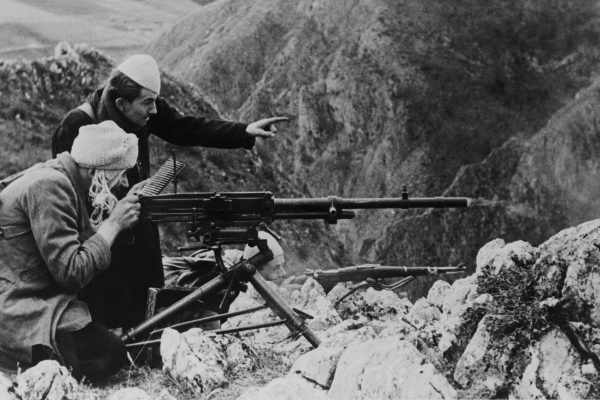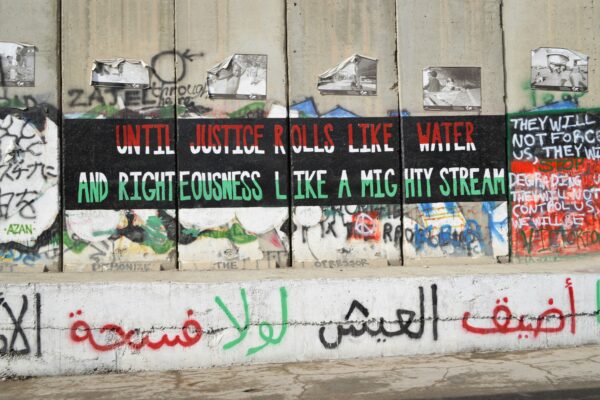As a young British Muslim, I am not just inspired, but also feel energised by the author’s passion to serve people and dedication in what he does. I never appreciated before what my ancestors have done for us, or how much of a struggle they faced, and what they had to sacrifice to make our community what it is today.
As a young British Muslim, I am not just inspired, but also feel energised by the author’s passion to serve people and dedication in what he does. I never appreciated before what my ancestors have done for us, or how much of a struggle they faced, and what they had to sacrifice to make our community what it is today.
Welcoming the new decade has meant changing fear into joy and powerlessness into powerfulness. The year 2019 was a tough year for Great Britain, particularly for members of faith groups. The rise of far-right politics, antisemitism, racism, Islamophobia, homophobia and anti-immigrant attitudes shaped Britain last year – with even more to be anticipated following Brexit.
I’m a young Muslim woman and proud to be a British citizen. Britain is my home, my safe heaven. However, since the recent political events following the EU referendum in 2016, I feel like I’m becoming a stranger in my own home due to the treatment I receive daily. Racism, hate, and extremism are on the rise. The wider British public is digesting this news and consigning it to the back pages of newspapers, if anything at all. Our society feels more and more polarised over the course of these political events.
New book A Long Jihad: MY Quest for the Middle Way by Dr Muhammad Abdul Bari gave me hope during these troubling times. It gives its readers a broad picture of how the British Muslim community has grown since the 1980s, and the writer explores themes of community activism, multiculturalism, and the illustrative and misunderstood keyword, ‘jihad’. Each chapter of the book unravels the theme in light of Dr Bari’s own authentic experiences and journeys.
As a first-generation Muslim, Dr Bari has been able to develop a huge connection with various segments of the Muslim community with patience and empathy. Along with other Muslim activists and leaders, he set about creating a Muslim umbrella body for wider representation and advocacy – the result was Muslim Council of Britain (MCB) that was launched in 1997. We see how the MCB has evolved to attempt to meet the various issues that Muslims are facing in Britain today.
The author shares some of the challenges he faced during his time as the General Secretary of MCB, particularly how the 7/7 bombing in London was a pivotal incident instilling fear in those around him. The immediate help he received was from Bishop of Stepney, Stephen Oliver, who ‘encouraged [him] with an assuring smile’ to handle the situation that he faced (page 115). It is because of the relationship Dr Bari developed with leaders from other faiths that bridges of solidarity were built and he was able to fight for other causes such as the London Living Wage, Community Land Trust (London CLT) and CitySafe havens to tackle knife crime and violence (page 59).
Muslim interaction and engagement with wider society significantly improved from the 1990s onwards through organisations like Young Muslim Organisation, East London Mosque, and the Muslim Council of Britain. The sad irony, of course, is that Muslims are still being criticised for not integrating enough and failing to ‘develop a stronger sense of shared identity’ – even with the record number of Muslim MPs elected in the UK General Election in 2019.
From this book, I learnt that it is not just the rise of far-right politics, but also a lack of engagement between faiths and ethnicities that are giving space for hate and extremism to develop. I agree with Dr Bari that, ‘Every citizen has a role to play in enriching society: through active civic participation, devotion to faith or belief, and duty to families and communities’ (pages 73 to 74). Therefore, we cannot stay in our own bubbles and expect things to get better for us. It is not just about ‘tolerating each other’ but also about ‘respecting and celebrating other’s good’, and to do that we must engage with one another and build relationships with people around us.
In the era of Brexit, we should ‘believe in the unity of diversity’ – this is one of the ways to liberate ourselves ‘from egotism and the disease of conceited individualism’ (page 74). He argues that this can be achieved by building trust and working harder to prove to wider society that we have Britain’s best interest at heart. We have the obligation to tolerate, respect, care, live-and-let-live and agree and disagree, these are not just British values but ‘universal, inclusive and Islamic’ values too (272).
Therefore, young Muslims ‘should enthusiastically engage in border civic movements to fight against social justice and inclusion and against intolerance, discrimination and social division’ (173). We should focus on issues affecting our neighbourhood and the nation we are living in. We should take an active part in community-led projects, work closely with our institutions and understand what challenges these institutions are facing today in order to tackle them. Young people must take part in the decision-making process, whether it is in their Student Unions, mosques or churches. Young Muslims sometimes fear to demand a space in their own institution: I myself fought to become a representative in the SU when I was a student, but never thought about becoming a trustee in my local mosque.
Although it is equally true that mosques and Muslim charities are failing to really identify youth talent, often we are just asked to volunteer and flout around the mosque with a fundraising bucket in hand and wearing a colourful branded t-shirt. Yet this is not the way to bring in young people, often graduates from top universities, who are taking more creative decision-making roles in the mainstream job market – and yet are being pushed out of community spaces. Once we bring generational diversity in our decision-making processes, and utilise creative dynamism, determination and leadership, we will ‘become change makers in the society; a people-power for good’ says Dr Bari (273). He says we must ‘participate in intellectual jihad’ and he advocates for ‘staying on the middle path’ which he argues is a social and religious requirement for Muslims. Creating a balance in our educational, social and religious life is a ‘jihad’ (struggle) most young Muslims appear to be facing today.
This book can be considered a fully packaged self-help guide that contains leadership guidance for the community leaders of all faiths, encouragement for young people, and advice for parents in the community. Dr Bari was courageous enough to challenge elders and young people in the same text, who are sometimes more comfortable expressing their anger rather than acting on an issue and bringing change in the community.
As a young British Muslim, I am not just inspired, but also feel energised by the author’s passion to serve people and dedication in what he does. I never appreciated before what my ancestors have done for us, or how much of a struggle they faced, and what they had to sacrifice to make our community what it is today. The racially motivated killing of Altab Ali in 1978 is still very relevant, even if the context is different. It shows the only way to defeat prejudice is for everybody to work together. It is important for young people to learn about our collective British immigrant history, as it allows us to see our origins and our contributions to British society. As well as seeing our strengths, it also gives us a sense of ownership and allows us to demand our space.
As a community organiser in Citizens UK, I have the privilege to work with communities to act together for power, social justice, and the common good. My job teaches me every day the role civil society plays in a democratic nation. As Dr Bari says, ‘a strong voluntary sector is the eyes and ears of any country’ (page 59). In the midst of growing ‘me first’ culture, a greater sense of communal solidarity and community spirit is needed more than ever. I am going to use my platform to build relationships with the broader community and I will care for justice that matters to all. Dr Bari’s strength in cultivating relationships beyond the Muslim community is a great example of how Muslims can play a positive role in the community and this is what I hope I can follow in my everyday work as a community organiser.
After reading this book, I am reclaiming the often-misunderstood word ‘jihad’. This book gave me a sense of belonging as it sets out some current issues that British Muslims, especially young people, have had to grapple with. For me, it is about improving myself and purifying myself through my intentions, patience, and determination to achieve the best for those around me. It is a jihad that I will fight for in this new year of 2020.





